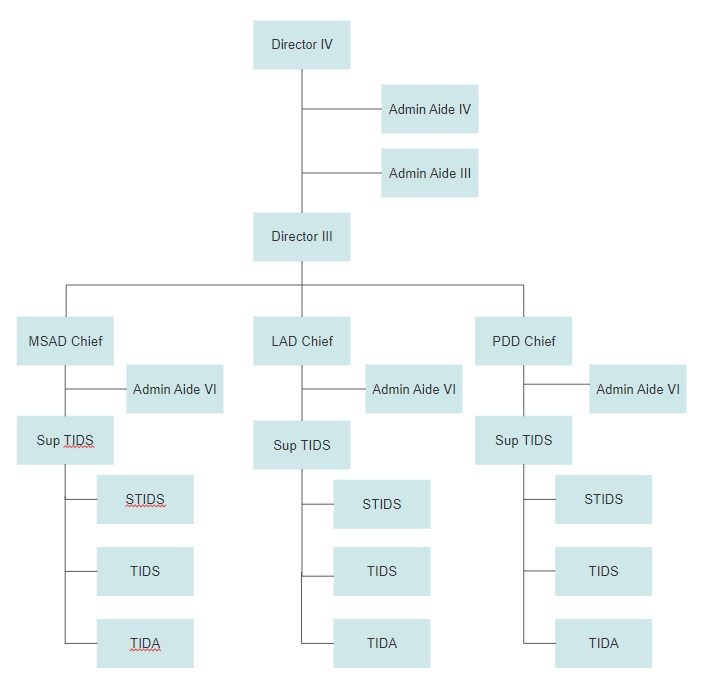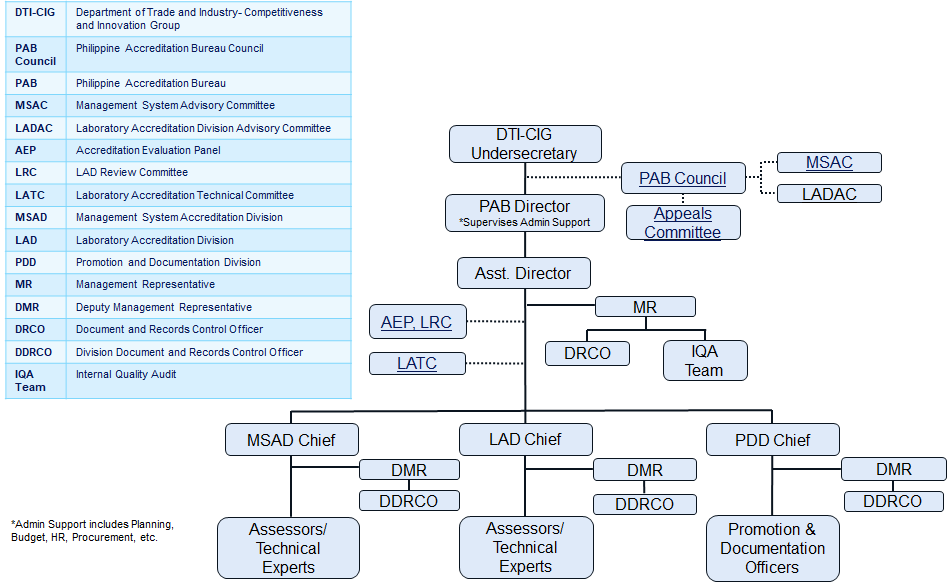About Us
The Philippine Accreditation Bureau (PAB) formerly Philippine Accreditation Office is the national accreditation body of the Philippines to accredit inspection, testing and certifying bodies, and other bodies offering conformity assessment services.
The PAB operates based on PNS ISO/IEC 17011, General requirements for accreditation bodies accrediting conformity assessment bodies
The PAB is recognized internationally through its membership to the International Accreditation Forum (IAF), International Laboratory Accreditation Cooperation (ILAC), Asia Pacific Accreditation Cooperation (APAC), Association of South East Asian Nations (ASEAN) Consultative Committee on Standards and Quality (ACCSQ) Working Group on Accreditation and Conformity Assessment (WG2) and International Halal Accreditation Forum (IHAF). PAB is also a signatory to the Multilateral Recognition Arrangement (MLA) for Quality Management System (QMS), Environmental Management System (EMS), Food Safety Management System (FSMS), and Product Certification Scheme of APAC and IAF, Mutual Recognition Arrangement (MRA) for testing, calibration, medical and inspection of APAC and ILAC.
PAB Milestones
| 2019 | |
| 27 February | Retained full membership to APAC MRA for the scopes of testing and calibration based on ISO/IEC 17025 and granted extension of signatory status for medical testing based on ISO 15189 and inspection body based on ISO/IEC 17020. |
| 21 February | By Virtue of Department Order No. 19-18 s.2018 issued by DTI Secretary Ramon M. Lopez, Philippine Accreditation Bureau (PAB) was transferred to the supervision of the Undersecretary for Competitiveness and Innovation Group (CIG). |
| 2017 | |
| 06 December | Granted full membership to International Halal Accreditation Forum (IHAF). |
| 29 March | By Virtue of Department Order No. 17-35 s.2017 issued by DTI Secretary Ramon M. Lopez, Philippine Accreditation Bureau (PAB) was transferred to the supervision of the Undersecretary for Industry Development and Trade Policy Group (IDTPG). |
| 2016 | |
| 09 June | Launch of Accreditation program for ISMS and EnMS Certification. |
| 2015 | |
| 10 December | Launch of PAB as a Bureau. |
| 2014 | |
| 02 June | Adoption and Implementation for the DTI Rationalization Plan in view with the Approval by DBM of DTI’s Rationalization Plan. |
| 2013 | |
| 17 October | Creating of Philippine Accreditation Bureau (PAB) under the Office of the Undersecretary for Consumer Protection Group (CPG) formerly Consumer Welfare and Trade Regulation Group of the Department of Trade and Industry. This is the result of approval by the Department of Budget and Management (DBM) of DTI’s Rationalization Plan (Pursuant to Executive Order no. 366 dated 04 October 2004). |
| 2011 | |
| 10-17 September | PAB hosted the 17th Asia Pacific Laboratory Accreditation Cooperation (APLAC) General Assembly and Technical Meetings. |
| 11-18 June | PAB hosted the 18th Plenary Meeting of the Pacific Accreditation Cooperation (PAC). |
| 2009 | |
| 18 May | Issuance of Executive Order no. 802 pursuan to Section 13 of Republic Act 9236 also known as “The National Metrology Act of 2003” Which strengthned and recognized the Philippine Accreditation Office (PAO) as the national accreditation body, the centra body to accredit inspection, testing and certifying bodies and other bodies offering conformity assessment services. |
| 2007 | |
| 26 October | Granted full membership to IAF MLA for Management System Certification (ISO/IEC 17021) in the scope of EMS (ISO 14001). |
| 12 July | Granted full membership to PAC MLA for Management System Certification (ISO/IEC 17021) in the scope of EMS (ISO 14001). |
| 2006 | |
| 11 April | Transfer of the accreditaiton functions from the Bureau of Product Standards to the Office of the Undersecretary of the Consumer Welfare and Trade Regulation Group making the Philppine Accreditation Office a full-pledge office in view of the issuance Department Administrative Order 04 by the former DTI Secretary Peter B. Favilla. |
| 2005 | |
| 17 November | Granted full membership to ILAC MRA for testing and Calibration (ISO/IEC 17025); former name as Bureau of Product Standards Laboratory Accreditation Scheme (BPSLAS). |
| 16 November | Granted full membership to APLAC MRA for Testing and Calibration (ISO/IEC 17025); former name as Bureau of Product Standards Laboratory Accreditation Scheme (BPSLAS). |
| 2002 | |
| 22 September | Granted full membership to IAF MLA for Management System Certification (ISO/IECC) 17021 in the scope of QMS (ISO:9001); former namd as Bureau of PRoduct Standards Accredtation Scheme (BAS). |
| 07 August | Granted full membership to PAC MLA for Management System Certification (ISO/IEC 17021) in the scope of QMS (ISO:9001); former name as Bureau of Product Standards Accreditation Scheme (BAS). |
| 1995 | Accreditation Schemes for Conformity Assessment Bodies (CABs) was handled by the Bureau of Product Standars (BPS) of the Department of Trade and Industry (DTI). |
Quality Policy, Objectives, and Impartiality Statement
The Philippine Accreditation Bureau (PAB) shall provide quality service to its customers that create the confidence in the competence and integrity of all PAB accreditation activities.
PAB shall provide accreditation service according to the requirements of internationally accepted standards, PNS ISO/IEC 17011 and applicable international guidance documents.
PAB is committed to:
- provide quality service to its customer that creates confidence in the competence and integrity of all PAB accreditation activities;
- provide accreditation service according to the requirements of internationally accepted standards, ISO/IEC 17011 and applicable international guidance documents;
- be impartial, fair, and objective in its dealing with conformity assessment bodies (CABs);
- contribute to the development and mutual recognition of practical and effective conformity assessment activities worldwide;
- observe confidentiality in all its dealing with CABs;
- ensure the integrity and value of the certificates issued by its accredited CABs;
- adhere to a high standard of competence, professionalism, integrity and good ethics;
- continually improve PAB quality by monitoring, measuring and enhancing the effectiveness of procedural systems.
Impartiality Statement
PAB is committed to uphold the integrity of its accreditation function by safeguarding impartiality of its operation.
As a government body, PAB is bound to be organized so that its accreditation is provided impartially. Organizational structure of PAB within its functional group and within DTI is identified to show any conflict of interest within the organization. Relationships with related bodies are identified, analyzed and documented, with the participation of interested parties. Where potential conflict-of-interest is identified, appropriate action is taken.
PAB, recognizing the risk involve in its accreditation activities, adopts a risk-based approach in developing, implementing and reviewing its policy, procedures, processes and in managing its people.
By virtue of Executive Order No. 802, PAB is the national accreditation body of the Philippines. It shall be the central body to accredit inspection, testing and certifying bodies and other bodies offering conformity assessment services needed by the country.
PAB Mandate
The PAB as national accreditation body of the Philippines is mandated to accredit inspection, testing, calibration and certifying bodies and other bodies offering conformity assessment services. Essentially, the PAB would:
- Strengthen the technical infrastructure in the country for better consumer protection and in making Philippine Products competitive in both domestic and foreign markets;
- Give recognition to conformity results through the assessment and evaluation of certification bodies or laboratories;
- Enter into mutual or multilateral recognition arrangements for acceptance by accredited bodies and institutions in the Philippines; and
- Support industries and consumers through the provision of reliable conformity assessment results.
Financial resources
PAB’s operation is financed by an annual budget allocation from the national government according to Presidential Decree 1177 otherwise known as the “Budget Reform Decree of 1977”. PAB prepares budget plan for the fiscal year which is incorporated in the Department of Trade and Industry (DTI) annual budget. The budgets include Personal Services (PS), Maintenance and Other Operating Expenses (MOOE) and Capital Outlay (CO).
PAB Organizational Structure

PAB Functional Structure

Regional and International Involvement
The PAB operates its accreditation schemes in accordance with PNS ISO/IEC 17011:2004, Conformity assessment – General requirements for accreditation bodies accrediting conformity assessment bodies and the applicable IAF/APAC and ILAC/APAC Mandatory and Guidance documents.
The PAB is recognized internationally through its membership to the International Accreditation Forum (IAF), International Laboratory Accreditation Cooperation (ILAC), Asia Pacific Accreditation Cooperation (APAC), Association of South East Asian Nations (ASEAN) Consultative Committee on Standards and Quality (ACCSQ) Working Group on Accreditation and Conformity Assessment (WG2) and International Halal Accreditation Forum (IHAF). PAB is also a signatory to the Multilateral Recognition Arrangement (MLA) for Quality Management System (QMS) and Environmental Management System (EMS) of APAC and IAF, Mutual Recognition Arrangement (MRA) for testing, calibration, medical and inspection of APAC and ILAC.
Generally, it takes some time for an accreditation body to achieve MRA/MLA member status. Aside from complying with the documentary requirements, the accreditation body has to fully implement the accreditation programs for which it is seeking signatory status and pass the peer evaluation.
 | International Accreditation Forum (IAF) The IAF is the world association of Conformity Assessment Accreditation Bodies and other bodies interested in conformity assessment in the fields of management systems, products, services, personnel and other similar programmes of conformity assessment. |

| International Laboratory Accreditation Cooperation (ILAC) The ILAC is a worldwide organization for laboratories and inspection bodies to help remove technical barriers to trade. |
 | Asia Pacific Accreditation Cooperation APAC ‘s primary role is to manage and expand a mutual recognition arrangement (MRA) among accreditation bodies in the Asia Pacific region. The MRA facilitates the acceptance of conformity assessment results (e.g. test reports, test certificates, inspection reports, and certification) across the region and with other regions around the world. Conformity assessment results that are produced by conformity assessment bodies (CABs) that have been accredited by one APAC MRA signatory are accepted by all the other APAC MRA signatories. |
 | Association of South East Asian Nations (ASEAN) Consultative Committee on Standards and Quality (ACCSQ) Working Group on Accreditation and Conformity Assessment (WG2) The ACCSQ WG2 is the working group of ASEAN focused into development of accreditation and conformity assessment technical infrastructure of member countries in line with applicable international standards and/or guidelines in order to achieve recognition by national/ regional/ international bodies. |
 | International Halal Accreditation Forum (IHAF) IHAF is an independent, non-government network of accreditation entities all mandated to enforce halal standards in their countries and regions. Empowered by its aim to protect the growing number of halal consumers and to facilitate international trade, IHAF establishes a solid ground for the global industry of halal food and non-food products. |



